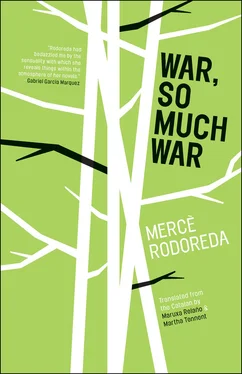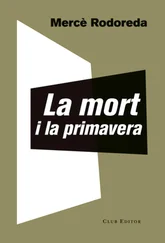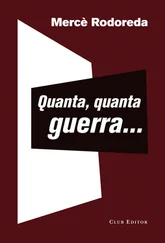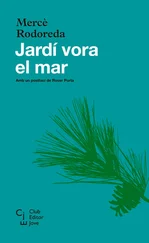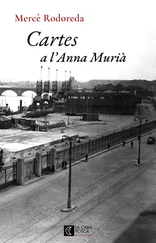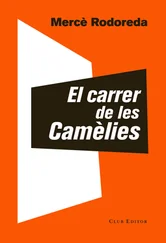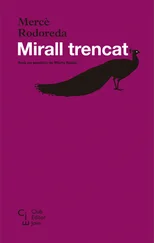The carpenter asked the bricklayer if he knew me. No. He was just passing by and we got to talking. Soon the bricklayer and I found ourselves alone. Time for bed now. We stretched out on the floor. I hadn’t been asleep for two hours when a voice woke me. Go home.
At daybreak everyone was back at work. I spent three days helping them pile up the rubble and remove the cement from the bricks, but on what would have been the fourth day I left them, not so much to get away from them, but to get away from the voice that woke me every night as soon as I fell asleep, go home, go home. .
A GIRL WAS CRYING BY A FOUNTAIN. ON HEARING MY FOOTSTEPS she raised her tearful eyes and covered her face with her hands as though wanting to hide her whole being from me. The water sang as it flowed and slipped away among the ferns. I didn’t know what to do, whether to walk on or stop and console the girl. She had her sleeves rolled up, exposing a bruise on both arms, above her elbows. I sat down near her. She backed away, stared at me and — like a shard of glass that suddenly shines in the sunlight — a bolt flashed across her eyes, I couldn’t be sure whether of fear or rage. She stood, sat back down, rose again, drank from the fountain while holding her hair back with one hand, sat down again, stood back up, and just as I was starting to think that she was about to go, she knelt before me and began to weep so helplessly that leaving her then would have required a heart of stone. Between sobs, she told me her name. Lena. Bent over, with her arms on my thighs and her head down, she confided in a low voice that her troubles all stemmed from her marriage. Look! She stood and showed me her bruises. Look! You see? My husband. I didn’t want to get married, I just wanted us to be sweethearts. He insisted we get married. I was only fifteen, I didn’t want to marry. He made me. Then came what I feared most: A husband is not a fiancé. He wasn’t the same person, he had become someone else. Always talking about dinner not being ready, or being too hot, too cold. . or not wanting it reheated. . How can he expect not to find it re-heated, she said, raising her head with a desperate look, if I never know when he’s coming home at night? The fish, he sometimes finds overdone, others undercooked. Vegetables, always overcooked. The meat is never tender enough, you let them cheat you at the shops; the peaches they gave you are bruised, you let them take advantage of you; this oil isn’t olive oil, you let yourself be swindled. You didn’t pull the sheets tight, the wrinkles kept me from sleeping. There aren’t any clean shirts. . why aren’t you doing the laundry? This shirt is poorly ironed, what’s on your mind when you’re handling that iron? And he drinks. He’s turned into a human cask filled with trodden grapes. And he wears me out. It’s true that sometimes I haven’t done the washing because I’ve been ill, and sometimes I’ve had to make the bed in a hurry because I’m behind on my chores. And why is that? Go up to the village, go down to the other village to fetch some potatoes, or beans, or a bit of rice. Go over to that town, go over to that other town to pick up a few chunks of soap. . because the war. . scoldings are my daily bread, they’re making me ill, making me wish to die, and I can only find consolation by talking about my woes at the fountain. . and she wept and wept with her head on my knees.
Through the trees I glimpsed a shadow drawing nearer. It was Lena’s husband — whose name, Magí, I already knew — looking exhausted and disarmingly innocent. He took me by the arm and led me under a willow tree. She’s been grumbling about me, hasn’t she? That’s all she does. I am an upright man, and a teetotaler, whatever she may say. She tells lies. She strings them together, one after the other. I married her because at age fifteen she found herself alone in the world, and I wanted to protect her. What would have become of her if I hadn’t taken her in? And I was desperately in love, too. But I’d been deceived. She wasn’t sweet, she wasn’t good. It was as though she had led a two-faced existence all her life, since childhood, and her duplicity was revealed once we were married. She’s a relentless faultfinder and name-caller, always accusing me of being up to no good, saying that if I come home late it’s because I’m mixed up in some trouble. I’m a mechanic and didn’t go to war because I’m missing a lung. She’s lazy, always about to pounce on me, claws ready, like a frenzied cat. One day a while back, at my wits’ end, I finally slapped her across the face, leaving her cheek flushed. Has she shown you the bruises on her arms? I caused them, yes, by pushing her away after she sprung herself on me trying to gouge out my eyes. She doesn’t put food on the table — she hurls it. The vegetables spill out of the serving dish; the stew flies out of the tureen. But in front of others she plays the poor unfortunate lamb. . and because she has the face of an angel just descended from the heavens, she has everyone’s sympathy. She has gone so far as to make people believe she was forced to marry a crook against her will. I spend nights wandering the streets, afraid to enter my own home. I never know what awaits me there, what she will hurl at me next. I walk the streets aimlessly until the small hours of the morning, by the haylofts, along the vegetable gardens. . dogs follow me, birds take flight when they hear me coming. And I’m always on the verge of pulling out my hair because of the awful mistake I made in marrying poor, poor Lena. Take a look at her — a good, long look. . We stepped closer. Lena was bent over crying, her tears mixing with the clear water that rushed to hide beneath the earth, and she peered at us out of the corner of her eye, with a touch of mischief on her lips that seemed to hold the threat of making her husband’s existence a living hell. I left them. I turned around after a while and saw them walking slowly in the fading light of dusk, their arms around each other.

That night, and for many more nights thereafter, I dreamed of Eva. She was standing in front of the reeds calling my name.
THE PATH WAS SHORT AND NARROW. IT STARTED AT A BEND IN THE road and was furrowed by ditches and strewn with upturned stones. On the left side, ensconced among cypress and cedar trees, was the garden of an old home. The fence around it — sharp-tipped wooden posts held together by rusty wire — was nearly concealed by a great thicket of honeysuckle, behind which grew a row of lilacs laden with clusters of dry seed. On the right side of the path, beyond a waterless fountain, was the courtyard of a massive farmhouse, lined with thirsty, withering, red and pink geraniums. Under an arbor, near a henless coop, lay a dead cat. The sun fell full on the façade, which was adorned with a sundial of yellow and blue tiles with a motif of branches and leaves. It was exactly noon. The path led to a square with only three houses, adjoined, shingles blackened, doors wide open as if everyone were out in the fields. In front of the houses, by a patch of red earth that was also crisscrossed by ditches, a waterless horse trough served me as a seat. Nearby, a cart full of hay lay on its side in a pool of blood. Standing in front of one of the houses, I cupped my mouth with my hands and shouted. No one answered. I shouted in front of one of the other houses as well: The echo returned my voice. I let out a third cry. Again, no one replied, so I entered, practically on tiptoe. On a round, skirted table was a carafe full of still-tepid coffee and a basket with a few slices of black bread. Just as I had done at the house with the mirror in the foyer, I salted the bread before dousing it with olive oil. Not a sound could be heard, only my chewing and the soughing of the wind, just enough of a breeze to sweep in a few dead leaves, a few motes of dust.
Читать дальше
